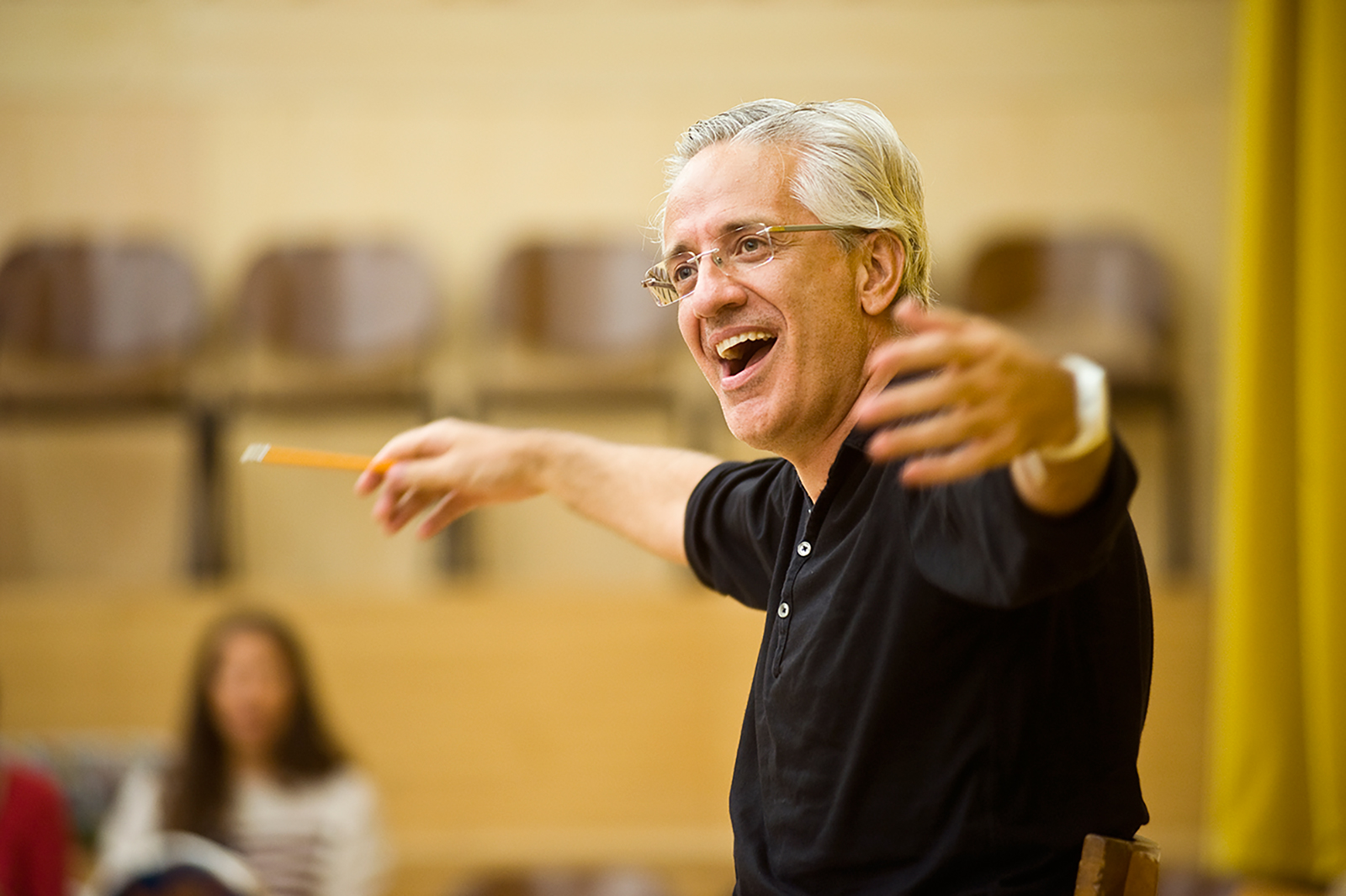Participative Concerts

Over 200 choir singers take to the stage of the Grand Auditorium on 8 and 9 December in order to sing Handel’s Messiah in the latest edition of the Participative Concerts. The vast majority are amateurs who are living out the so deeply memorable experience of participating in a concert featuring in the Gulbenkian Music season. We went along to watch a rehearsal and speak with some of the participants in this initiative that is now into its third edition.
Early afternoon on a grey November Saturday, dozens of people of various ages begin gathering at the Gulbenkian Foundation. They enter whether alone or in pairs or in small groups, through the main entrance or through the Rose Garden, carrying beneath their arms a musical score. They give their details at the entrance and head down two floors to the artists’ bar next door to the Gulbenkian Orchestra rehearsal room. There, they check their names on lists divided up into vocal ranges placed upon a table.
Having confirmed their presence, sopranos and contraltos head off to one room while the baritones and tenors go to another. This was the fifth day of rehearsals for the Participative Concert and open only to these guest singers. Grouped by voice type, the maestro João Branco works with the sopranos and the contraltos while Fátima Nunes, a member of the Gulbenkian Choir, puts the baritones and tenors through their paces.
This year, the number of candidates applying to participate in this concert exceeded six hundred. Following an initial selection stage, 220 choir singers were recruited. From the beginning of rehearsals in September, this number has shrunk somewhat (there are always some dropouts) and currently standing at 180 members: 100 women and 80 men. Throughout almost two hours, after the period of warmup exercises, the singers work away at pages of the score. Their maestros tirelessly explain how best to approach the most demanding sections and making the group repeat them time and time again until achieving the sought after standard of excellence. Later, after a short break, they then all join together for a rehearsal now conducted by Paulo Lourenço, the assistant Gulbenkian Choir maestro. The 180 singers only get to join the Gulbenkian Choir and Orchestra for the final rehearsal after many long hours of work with Paulo Lourenço and the other assistant maestros.
A human adventure
The enthusiasm with which Paulo Lourenço embraces this project is patently clear to all in the way he conducts the rehearsal, gesticulating, leaping around in efforts to convey the “soul” of this monumental work and the technical tools necessary to approaching it. “Keep up the energy”, he proclaims loudly, “most important is keeping the pump working”. The relaxed and good humoured ambience is nurtured by the frequent comments from the maestro that trigger giggles of laughter from the singers. “No arms”, the maestro yells, “I don’t want any gestures, I only want better sustained breathing”. He constantly interrupts the singers in their performances with surgical observations: “Taking advantage of the longer notes to relax is where the problem lies. That blocks the breathing.” Or, alternatively, comments for specific vocal ranges: “Tenors, I need your entrance, I almost didn’t understand what was happening. Were you not feeling confident?” Or, later on: “Basses, sing that as if to the birds.” The comment that drew the most laughter. The repetitions continue until beginning to elicit the praise of the maestro: “Well indeed, that was good, wasn’t it?” or “Bravo, each time and getting better!” In a break in the rehearsal, we asked the maestro about what it was like preparing a totally amateur choir with the criteria of demand and professional quality that the Gulbenkian Music program requires. “There’s a lot of joy and happiness but it’s also always a great challenge”, he replied. “These rehearsals are more than a musical adventure, they are an authentic human adventure.” This particularly proves the case here as Handel’s music is, above all, “music of truly human expression” and thus being associated with this project “is an ever renewing pleasure”.
Paulo Lourenço furthermore highlights not only the artistic dimensions to these concerts but also what they represent in educational terms as he believes that many of these singers go onto participate in choral music based upon their experiences. “Their children will also be exposed to the virus of choral music and guaranteeing that our audiences are also ever better informed as many performers will be our future audiences.”
Gulbenkian Choir and Orchestra in Barcelona
These Participative Concerts take their inspiration from an initiative staged in Spain by Fundación La Caixa de Espanha, which has held these concerts in Barcelona, and always with Handel’s Messiah, for the last two decades. At Gulbenkian Music, the first edition provided the opportunity to hear Carmina Burana by Carl Off, but the second year was already approaching this masterpiece of Baroque sacred music as is also the case with the third edition taking place this month. The concert, performed by the Gulbenkian Orchestra and Choir in conjunction with its guest choir, is conducted by the maestro Victor Pablo Pérez, with the participation of Elisabeth Watts, Marta Infante, Emiliano Gonzalez Toro and José Antonio López and takes place on 8 and 9 December in the Foundation’s Grand Auditorium. This same concert is then again performed by the Gulbenkian Orchestra and Choir in the Palau de La Musica Catalana in Barcelona on 12 and 13 December. While the orchestra and choir remain the same, on this occasion they share the stage with the Participative Choir of Spain.
